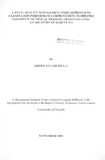| dc.description.abstract | Technical Training plays a crucial role in Kenya's development process. The Industrial Transformation and Poverty Eradication Plans rely on Technical Training Institutions for the achievement of their training objective and economic empowerment of the people. Poor examination performance in diploma courses in Technical Training Institutes therefore affects the supply in quantity and quality of trained technicians for the achievement of these objectives.
The purpose of this study was to establish the existence or non-existence of non-quality situations in the training process at Kabete TTl, identify the root causers) of poor performance in diploma examinations, and come up with a TQM-Based Suggested Improvement. Data was collected from third-year diploma students, diploma lecturers, management and support staff: Four data collection instruments, namely, questionnaires, interviews, observation and abstractions were used. Data collected was analyzed both quantitatively and qualitatively. The possible causes of poor examination performance were categorized as People, Materials, Procedures and Facilities.
The study revealed that non-quality situations existed in Internal Examinations handling whichcaused frequent examination leakage and cheatings.
The People problem arose due to rampant indiscipline and lack of commitment in students; low student-centredness by, and inadequate training of, the lecturers; and failure of managementthrough the Principal to enforce standards of performance and behaviour.
Materials, which included textbooks, learning and reference materials, were in acute shortage, particularly in Technical and Applied Sciences courses. The major problem with Procedures included high workload for staff: which left them little time to offer consultation with students. Facilities were in acute shortage and most equipment outdated. Over admission of students constrained available facilities causing acute shortages. In addition, the institutehad no arrangements for replacing old equipment due to financial constraints.
It was concluded that People were the major cause of poor performance 111 diploma examinationsat Kabete TTl, followed by Materials.
On the basis of the findings the following were among the recommended suggested improvements:
1. The management should specify on admission, and enforce, the required standards of
performance and behaviour through effective implementation of the Academic and
Disciplinary Policies.
2. Lecturers should be more student-centred through the use of appropriate IIllX of teaching techniques, and by availing themselves for consultation.
3. Lecturers with inadequate training should seek opportunities for further training or be redeployed to appropriate levels.
4. A separate Materials Bank Account, to which all materials monies charged on students are deposited, should be maintained. This should be expended against a comprehensively prepared Materials Usage Budget.
5. Common course assessment schedules should be introduced to ensure that adequate number of tests and assignments are given to enhance practice and instill a reading culture and a spirit of excellence in students.
6. Stage examinations should be externally moderated and marked scripts passed to external examiners for scrutiny. Improved handling will also curb rampant cheating and. Leakage.
7. The management should take audit of the available facilities before admitting students or introducing new courses, in order to alleviate congestion and acute inadequacy of facilities.
8. A plan of maintenance of facilities and purchase schedule for modern equipment should be developed, and funding sought both internally and externally. | en |

